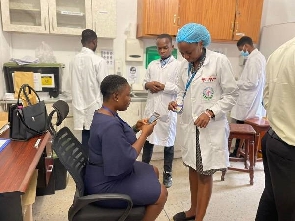 An official of APHC checking to verify the licence of one of the laboratory personnel
An official of APHC checking to verify the licence of one of the laboratory personnel
A total of four private laboratories in Accra have been closed down by the Allied Health Professions Council (AHPC) for engaging the services of unlicensed personnel and using equipment that are not fit for purpose.
They are Acumed Diagnostic Service, Samsandy Health Centre, Chalton Medical Centre, and Occuhealth Health Centre.
According to Mr Kweku Asenso Brobbey, Deputy Director of Public Relations, AHPC, the laboratories failed to meet the required operational standards in the practice of allied health service delivery.
Briefing the Ghanaian Times in Accra yesterday, he said the closure of the laboratories followed an inspection and enforcement exercise conducted by the Council at the Korle Bu Teaching Hospital (KBTH).
He explained that the laboratories were closed down after checks revealed they were not working in line with the provisions of the Health Professions Regulatory Bodies Act.
The council, Mr Brobbey said, was mandated to inspect allied health facilities and make sure all of them were conforming to the highest standards of practice in the country.
“The inspection and enforcement exercise, which began on October 9 this year, will continue to the end of the year, and enable the council to access and ensure the highest standards in the practice of allied health professionals in the various medical laboratories across the country.
The nationwide monitoring and inspection exercise is to fish out and apprehend quacks and persons practicing professionals without licence and facilities that do not meet AHPC standards,” Mr. Brobbey noted.
He stated that the responsibility of the Council was to ensure that quacks were eliminated from the allied health practice in the health delivery system to ensure the delivery of quality health service.
Despite the closure, Mr Brobbey stated that the inspection revealed that most facilities, especially those operating in hospitals to provide allied health services were in good standing with the council.
However, he said there were few exceptions which the council was committed to deal with as stipulated in the allied health professional regulations.
“When there is a quack in a facility, we ensure that the person who employed the quack and the person putting himself up in that position are both prosecuted.
The council remains committed to fostering a culture of compliance, safety, and accountability within Ghana’s health delivery sector,” Mr Brobbey stated.
The Director of Medical Affairs of KBTH, Dr Frank Owusu-Sekyere, commended AHPC for the exercise as it would ensure quality health delivery.
He noted that the presence of quack and unlicensed personnel and the use of equipment not fit for purpose in the health system was a danger to the effective delivery of healthcare services in the country, hence the need for all to support their efforts.
So far, eight hospitals, 10 private laboratories, and one clinic have been inspected.
These include KBTH, Pentecost Hospital in Madina, Ga East Hospital, University of Ghana Medical Centre, Cocoa Clinic, Adabraka Hospital, Abodwe Clinic and Holy Trinity Hospital